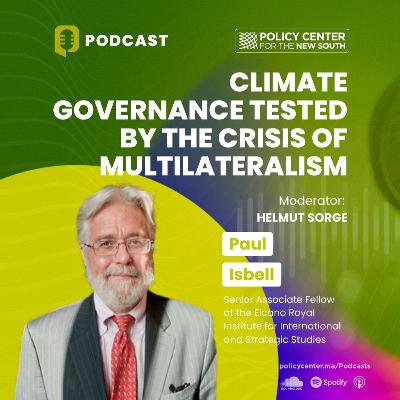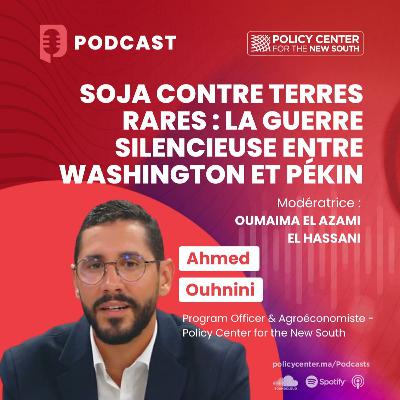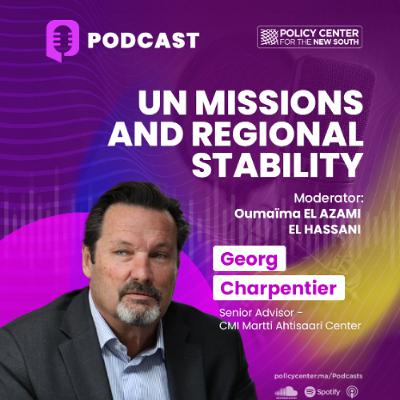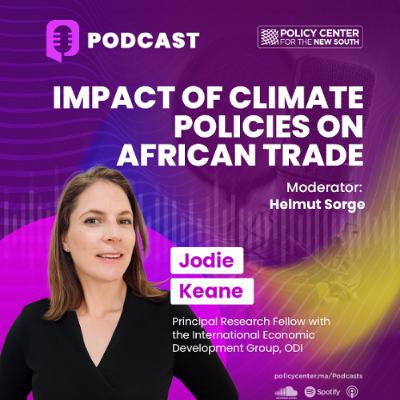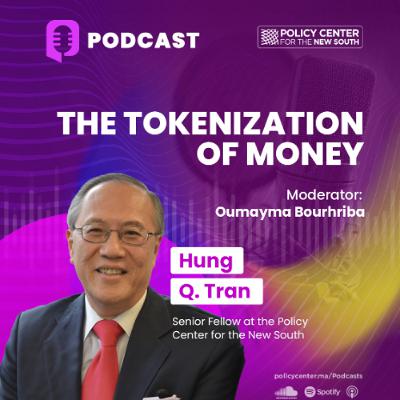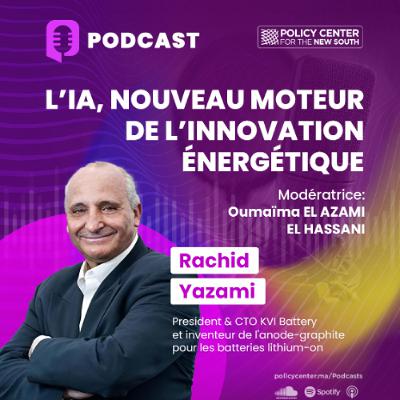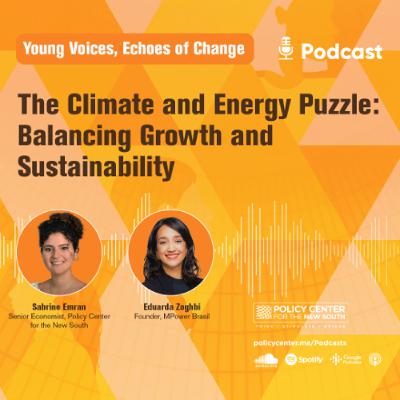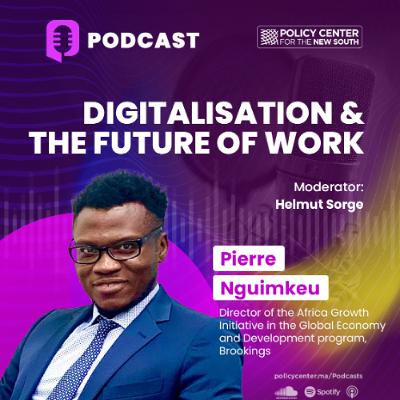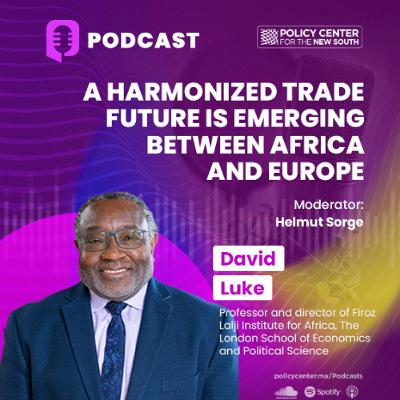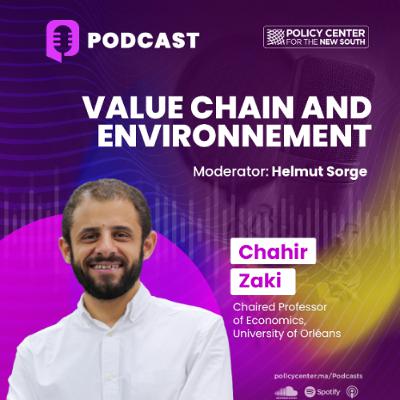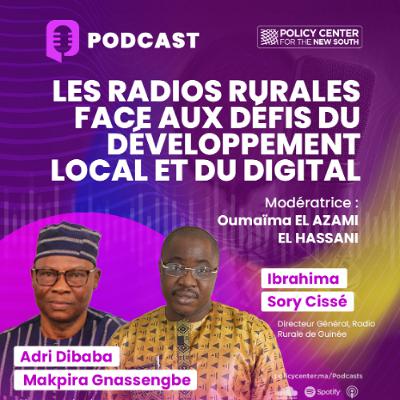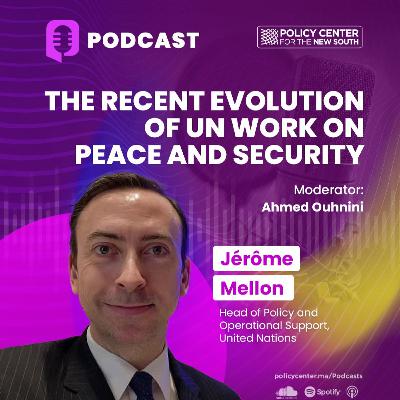Discover Policy Center for the New South Podcasts
Policy Center for the New South Podcasts
Policy Center for the New South Podcasts
Author: Policy Center for the New South
Subscribed: 28Played: 349Subscribe
Share
© All rights reserved
Description
Moroccan ThinkTank that functions as an open debate platform, bridging between policy making & research. Organizes yearly the Atlantic Dialogues #AD2025
454 Episodes
Reverse
By Amal El Ouassif and Alessandro Cercaci
In this episode, we examine the Mattei Plan, launched by Italian Prime Minister Giorgia Meloni, and its implications for Italy’s engagement with Africa, particularly around migration. Framed as a non-predatory approach, the Plan promotes co-creation with African partners across sectors like education, health, energy, agriculture, and water. We’ll analyze whether it signals a genuine shift in Italy’s Africa policy or a tactical repackaging of national interests, its connection to initiatives like the EU Global Gateway and the G7’s PGII, and the challenges it faces in addressing migration and extractivism.
By Paul Isbell & Helmut Sorge
Global climate governance remains resilient despite U.S. federal withdrawal and rising climate skepticism. Paul Isbell argues that the energy transition is now economically inevitable, with solar and wind becoming the world’s cheapest power sources. China leads the decarbonization sector, while many U.S. states, cities, and companies continue climate action. A broad global coalition ; Europe, BRICS, Africa, Latin America ; keeps the transition on track.
Par Christophe Chabert & Helmut Sorge. Dans cet épisode du Policy Center for the New South, Christophe Chabert analyse les crises interconnectées entre l’Iran, l’Afghanistan, le Pakistan et l’Inde, en retraçant leurs racines historiques et coloniales. Il met en avant l’impact des rivalités géopolitiques et estime que la paix viendra des nouvelles générations, prêtes à dépasser les clivages religieux et politiques hérités du passé.
Par Abdesalam Saad Jaldi et Meryem Amarir.
Cet épisode revient sur la trajectoire politique et économique de l’Algérie depuis le mouvement du Hirak en 2019. Il analyse la consolidation du pouvoir militaire, les limites de la transition démocratique, et les contradictions d’un modèle économique toujours centré sur la rente pétrolière. À travers une lecture politique, sécuritaire et sociale, l’épisode met en lumière la tension persistante entre aspirations citoyennes, inertie institutionnelle et rivalités régionales.
Par Ahmed Ouhnnini, agro-économiste & Oumaïma EL AZAMI EL HASSANI / Program Officer - Social Media & Digital Content
Dans ce podcast, nous verrons comment une simple graine est devenue un levier de puissance mondiale, reliant les fermiers du Midwest américain aux usines chinoises. Entre sécurité alimentaire, rivalités commerciales et dépendances stratégiques, ce récit dévoile comment l’alimentation et les ressources naturelles redessinent les rapports de force du XXIᵉ siècle.
Dans ce podcast, notre Senior Fellow Francis Perrin souligne que l’Afrique reste très dépendante des énergies fossiles : malgré 20 % de la population mondiale, elle ne consomme que 3,5 % de l’énergie. Il plaide pour une meilleure gouvernance, des cadres d’investissement stables et la valorisation des compétences africaines afin de soutenir une transition énergétique durable.
Georg Charpentier, Senior Advisor at CMI Martti Ahtisaari Centershares insights on the dynamics of United Nations peace operations and regional stability. He underscores the importance of national ownership, the transition from humanitarian assistance to sustainable development, and enhanced coordination with African institutions to promote durable peace and resilience.
Jodie Keane, Principal Research Fellow at the International Economic Development Group, discusses how green trade measures are transforming African economies, stressing the need for fairer transitions, climate-compatible trade policies, and greater value addition to ensure Africa benefits from the global green shift.
by Oumayma Bourhriba, Senior Economist at the Policy Center for the New South and Hung Q. Tran, Senior Fellow at the Policy Center for the New South
This episode of the Policy Center for the New South Podcast features Dr. Hung, Senior Fellow, discussing the tokenization of money and its impact on the global financial system. He explains how digital tokens, stablecoins, and CBDCs are transforming transactions and international payments, while raising issues of regulation, trust, and cybersecurity. The conversation highlights how this evolution could shape a multi-currency digital future driven by technology and geopolitics.
Rachid Yazami, Président & Directeur technique de KVI Battery et inventeur de l'anode-graphite pour les batteries lithium-ion, revient sur le rôle de l’intelligence artificielle dans l’optimisation de la performance énergétique et l’innovation scientifique. Il souligne son apport dans l’amélioration du stockage, la découverte de nouveaux matériaux et la gestion intelligente de l’énergie, tout en rappelant que l’IA reste un outil au service de l’intelligence humaine.
by Helmut Sorge and Rida Lyammouri, Senior Fellow at the Policy Center for the New South
Rida Lyammouri, Senior Fellow at the Policy Center for the New South, examines the rise of drone use by non-state armed groups in the Sahel. The discussion highlights how civilian drones are being transformed into weapons, the regional security implications of these tactics, and the importance of stronger coordination among states to confront this evolving threat.
By Sabrine Emran, Senior Economist and Eduarda Zoghbi, Founder, MPower Brasil
The global energy landscape is at a critical turning point. While the urgency to act on climate change is clearer than ever, energy security concerns - amplified by geopolitical tensions and uneven development - continue to weigh heavily on national agendas. For many countries in the Global South, the challenge is even more complex: how to accelerate the green transition without compromising economic growth, social equity, and energy access. This episode explores the tough trade-offs and innovative opportunities shaping the global energy transition. How can international climate finance support just and inclusive pathways? What role should emerge economies play in driving reform, and how do gender, youth, and local leadership fit into the equation?
This conversation is part of Young Voices, Echoes of Change, a podcast series that amplifies young experts' perspectives on global affairs, offering new insights on the challenges and opportunities shaping our world.
Pierre Nguimkeu, Director of the Africa Growth Initiative at Brookings, examines Africa’s digital transformation and its impact on work, education, and the economy. From mobile technology and online learning to the rising gig economy, he discusses the opportunities, challenges, and potential for inclusive growth across the continent.
by Helmut Sorge & David Luke, Professor and director of Firoz Lalji Institute for Africa, The London School of Economics and Political Science
Professor David Luke, Director of the Institute for Africa at LSE, explores Africa’s economic potential and its ties with Europe. He discusses demographics, trade asymmetries, the African Union, and the AfCFTA, highlighting the role of industrialization and strategic resource use in driving sustainable growth amid a changing global economy.
Amid global shocks and shifting trade dynamics, this episode explores how Africa can navigate tariffs, debt, and fiscal reforms to strengthen its economies. The conversation sheds light on the slow progress of continental free trade, the pressures of external debt, and the opportunities tied to strategic minerals. It also reflects on the boldness required for African nations to shape their economic future.
by Helmut Sorge, Columnist and Chahir Zaki - Chaired Professor of Economics, University of Orléans
This episode explores the intersection between value chains and the environment, examining how sustainable practices, green innovation, and environmental challenges are reshaping production, trade, and development strategies. It highlights the opportunities and trade-offs in building value chains that balance economic growth with ecological responsibility.
par Abdeslam Saad Jaldi, Raja Bensaoud - Juriste en droit des Affaires et du Numérique
Ce podcast met en lumière les différences entre open data et droit d’accès à l’information, deux notions distinctes mais complémentaires. À travers le cas du Maroc, il revient sur l’adhésion à l’Open Government Partnership en 2018 et sur les efforts menés pour renforcer la transparence. L’épisode dresse également un bilan de l’avancement du programme Open Gov et des limites du cadre juridique actuel, tout en ouvrant la voie à des pistes de réforme face aux critiques nationales et internationales.
by Helmut Sorge, Columnist and Emmanuel Owusu-Sekyere, Director of Research, Policy & Programs, ACET
In this podcast we explore how Africa can achieve sustainable development by leveraging its resources, youthful population, and digital economy. It emphasizes inclusive growth, social equity, and policies that benefit all segments of society. Resilience against global shocks, climate change, and geopolitical tensions is highlighted as key to long-term stability.
By Oumaïma EL Azami El Hassani / Program Officer - Social Media & Digital Content, Ibrahima Sory Cissé / Directeur Général, Radio Rurale de Guinée, Adri Dibaba Makpira Gnassengbe / Directeur national, Radios Rurales du Togo.
Dans cet épisode, Ibrahima Sory Cissé et Adri Dibaba Makpira Gnassengbe partagent leur expérience à la tête des radios rurales en Afrique de l’Ouest. Ils évoquent le rôle crucial de ces médias de proximité dans la sensibilisation, la cohésion sociale et le développement local. Un échange riche autour des défis actuels, de la transition numérique et de l’ancrage territorial des radios rurales.
By Ahmed Ouhnini and Jérôme Mellon, Head of Policy and Operational Support - United Nations.
In this episode, we explore how the United Nations works beyond traditional peacekeeping contexts to support justice and security sector reform in fragile contexts. Our guest, Jérôme Mellon, Head of Policy and Operational Support at the UN’s Office of Rule of Law and Security Institutions, shares two decades of experience from Kosovo to Mali to São Tomé and Príncipe. We discuss the evolving nature of UN engagements, the challenges of strengthening institutions in countries without a peacekeeping presence, and lessons learned from the field in Sub-Saharan Africa.
The views expressed in this podcast do not necessarily reflect the views of the United Nations Secretariat and are those of the authors.



